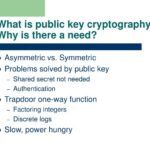As we stand on the precipice of a rapidly evolving technological landscape, one term recurs within discussions of security, privacy, and data integrity—quantum cryptography. Frequently heralded as a leap into the future of secure communication, the rhetoric surrounding quantum cryptography often verges on the fantastical, evoking images of science fiction narratives rather than distilled scientific principles. Yet, is this extraordinary claim merely a modern buzzword, or is it an imminent and transformative reality? The crux of this inquiry lies in understanding quantum cryptography’s fundamental underpinnings and its potential implications for the field of cryptography.
To start, it is imperative to delineate what quantum cryptography entails. At its core, quantum cryptography leverages the principles of quantum mechanics—principally, the phenomena of superposition and entanglement—to secure communication channels. Unlike classical cryptographic methods, which are predicated on mathematical complexity, quantum cryptographic systems exploit the intrinsic properties of quantum bits (qubits). Within this framework, any attempt to eavesdrop on the communication results in perturbations detectable by the legitimate users, thus ensuring robust security. This inherently creates a dichotomy between traditional encryption measures and the avant-garde propositions offered by quantum mechanics.
However, amidst the enthusiasm surrounding quantum cryptography, a panoply of challenges must be acknowledged. The theoretical foundations of quantum cryptography provide a compelling narrative, but the practical application raises pertinent questions. For instance, the technology necessitates the establishment of quantum key distribution (QKD) networks, which can be significantly hampered by physical limitations. Implementing such systems requires specialized infrastructure capable of facilitating the transmission of qubits over substantial distances—a hurdle that classical systems have already navigated. As such, the question emerges: Can we effectively translate quantum cryptography from the laboratory into the real world where distance, cost, and scalability formulate substantial barriers?
A vital element of this inquiry involves assessing the sufficiency of existing quantum technologies. Quantum repeaters, designed to extend the range of QKD networks, stand at the forefront of this discussion. Their operational mechanics hinge upon the efficient transfer of quantum information over long distances, necessitating advancements that are still in nascent stages. Until the precursor technologies are matured, the prospect of widespread quantum cryptography may remain an exhilarating yet elusive aspiration. In this brew of uncertainty, the skeptic might ask, is the quantum dawn truly near, or do we risk being paralyzed in the interminable twilight of development?
Moreover, one must consider the cybersecurity landscape as a whole. Quantum cryptography emerges as a response to the haunting specter of potential quantum computers capable of dismantling classical encryption protocols. The logic dictates that as quantum computing advances, traditional methods—rooted in computational complexity—will falter under the blistering efficiency of quantum algorithms, particularly Shor’s algorithm, which threatens to decrypt data secured by commonly employed systems. Yet, whether quantum cryptography can adequately replace these systems before the quantum computing revolution renders them obsolete is a question cloaked in uncertainty. The pace of technological advancement can be capricious and unpredictable. Will quantum cryptography rise to the occasion or falter in the face of relentless progress?
In addition to technological barriers, a philosophical and ethical dimension must be explored. Quantum cryptography promises unprecedented levels of security. However, this potential raises principled questions surrounding privacy, surveillance, and the balance of power in a digitally interconnected world. Could quantum-enabled systems inadvertently empower entities with greater access and control over information flows, enhancing existing power imbalances? The challenge here lies in ensuring that the advent of enhanced security does not morph into a tool of oppression. As we advance toward a quantum-driven future, ethical considerations are paramount and require deliberative engagement from technologists, ethicists, and policymakers alike.
It is essential to remain cognizant of the broader implications of quantum cryptography. As its principles skirmish at the intersection of physics, computer science, and ethics, the repercussions stretch far beyond technical proficiency. The advent of quantum cryptography could herald a new era of data sovereignty wherein individuals exert more control over their information. However, this potential must be tempered with lucidity and responsibility, ensuring that such power is wielded equitably.
The time is ripe for reflection upon the pivotal question at hand: Is quantum cryptography a sci-fi buzzword, or an imminent reality? One could argue that the entwined trajectory of technology and needs within contemporary society propels it from mere speculation to tangible application. Yet, the uncertainty surrounding the current challenges suggests that the path to realization is not straightforward. It is populated with hurdles requiring innovative solutions, ethical stewardship, and a commitment to interdisciplinary collaboration.
As we venture further into the 21st century, the advancements in quantum technologies will undoubtedly unfold with a complex intermingling of triumphs and tribulations. This space is entrancing and warrants rigorous exploration by all stakeholders involved, from consumers to developers, policymakers to academics. Thus, while the allure of quantum cryptography tantalizes many, its eventual conversion from abstract theory to practical application remains contingent on overcoming the myriad challenges that lie ahead.








Leave a Comment